

Miriam Halpern Pereira is a Portuguese historian born in Carcavelos in 1937 into a Jewish and multinational family with diverse cultural backgrounds, to which the study of history provided an even more plural and collective past. Her love of history began early, during her secondary education at the former D. Filipa de Lencastre secondary school, with Professor Maria Emília Cordeiro Ferreira and later with Professor Maria Lucília Estanco Louro. She completed her secondary education in Lisbon and then enrolled at the Faculdade de Letras [School of Arts and Humanities] in that city to study History and Philosophy, graduating in 1962. University education in general disappointed her due to its conservative orientation and scientific obsolescence. Nevertheless, she prepared a degree thesis entitled A Crise Económica de 1876 [The Economic Crisis of 1876], under the supervision of Jorge Borges de Macedo. However, the thesis was never defended, as its author left for Paris in 1962 to accompany her husband, the journalist Carlos Veiga Pereira, who was forced into exile for political reasons.
She settled there and lived for ten years, in difficult circumstances, especially in the early days. However, leaving Portugal would prove to be a fundamental experience for her career as a historian. In Paris, she attended the École Pratique des Hautes Études en Sciences Sociales, which opened up new academic horizons, allowing her to rapidly update her scientific knowledge, both through the professors and historians associated with the Annales school and Marxism, whom she met as a student and who left a lasting impression on her, and through her access to good libraries and well-organised archives. Among these historians were such notable figures as Fernand Braudel, Ernest Labrousse, Albert Silbert (with whom she would remain very close even after her return to Portugal) and Pierre Vilar, who would become her doctoral thesis supervisor. She completed her doctorate in 1969, defending her thesis at the University of Paris I-Sorbonne, in the School of Arts and Humanitiesand Human Sciences. After obtaining her doctorate, she began her career as a researcher at the Marc Bloch Institute of the same university, linked to the Centre National de la Recherche Scientifique (CNRS) between 1970 and 1973. During those years, she also taught at the University of Vincennes.
This work is financed by national funds through FCT - Foundation for Science and Technology, I.P, in the scope of the projects UIDB/04311/2020 and UIDP/04311/2020.
